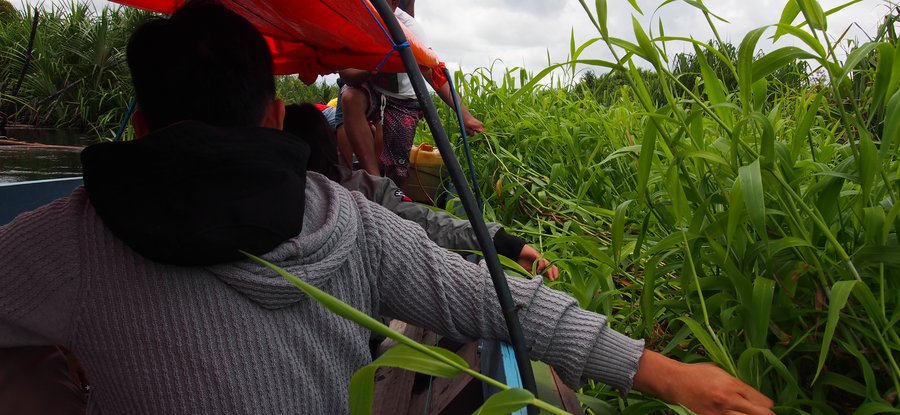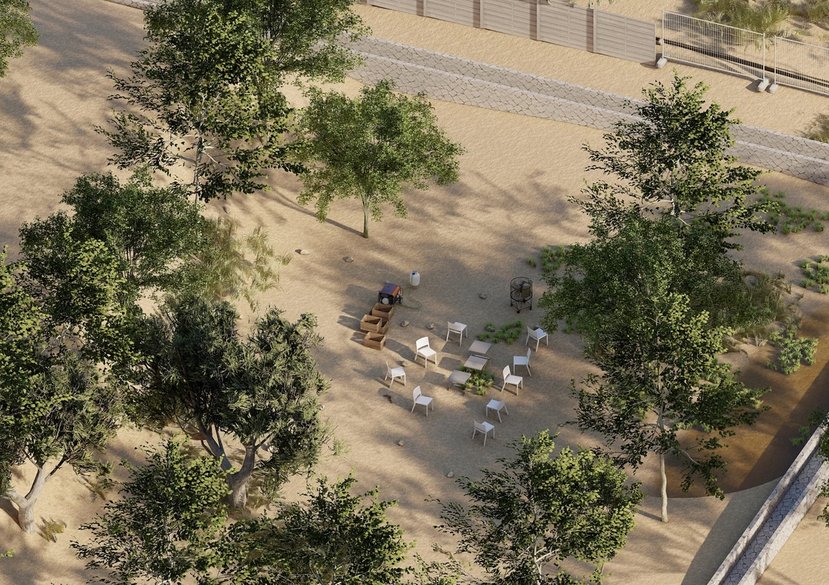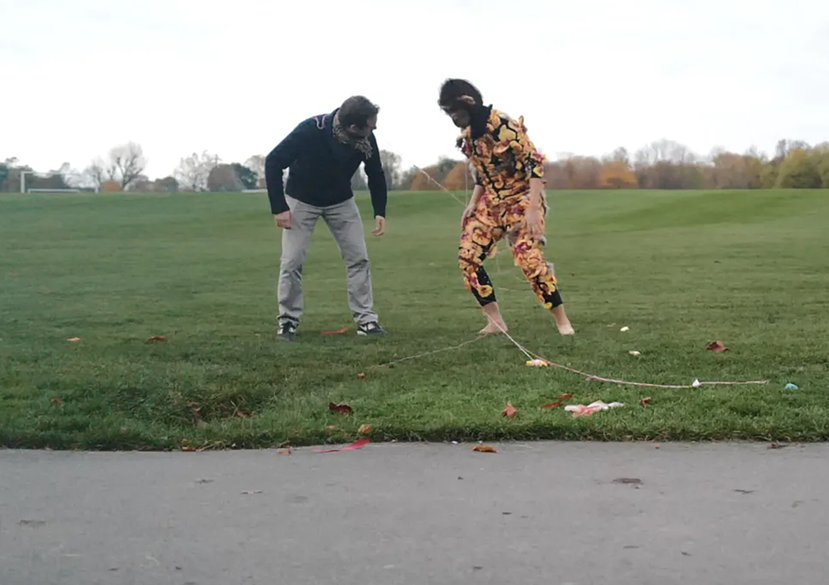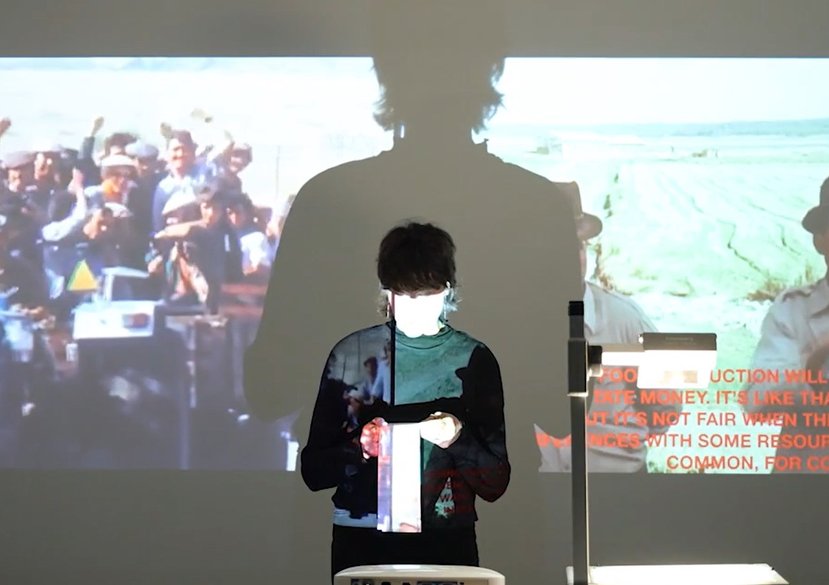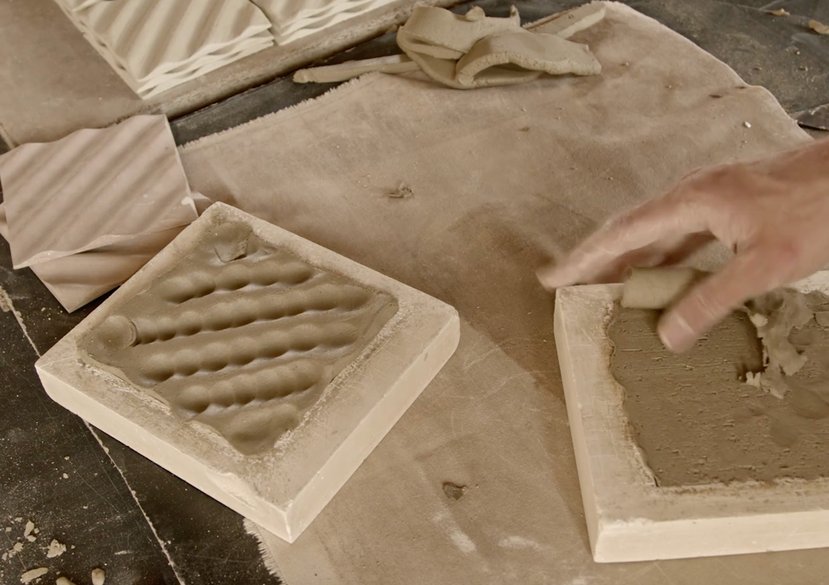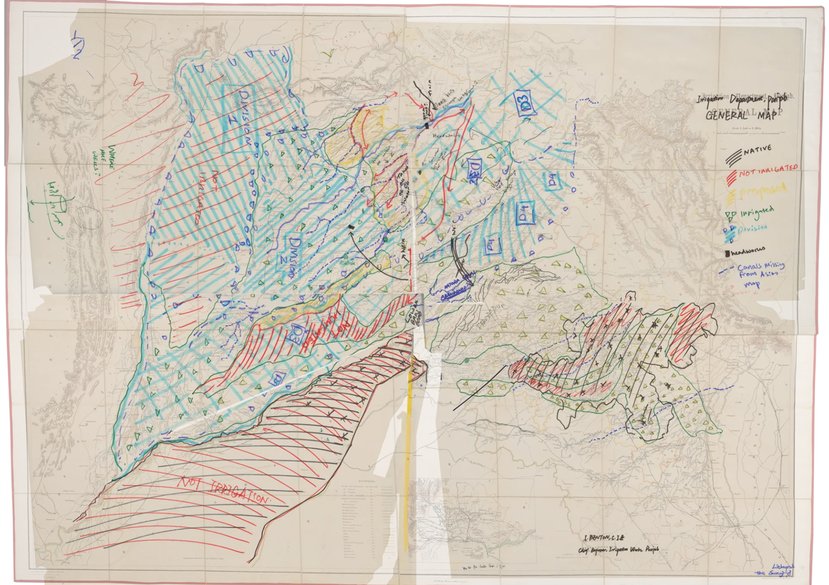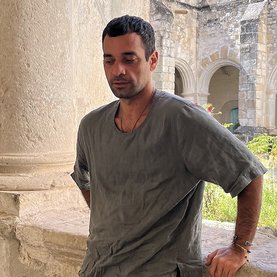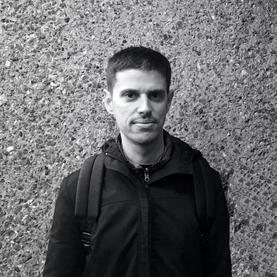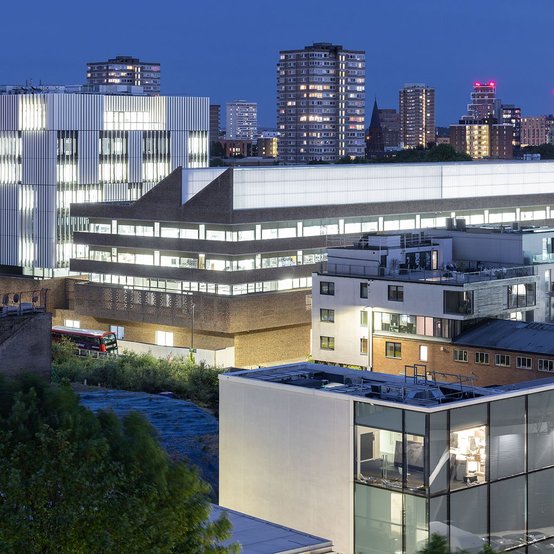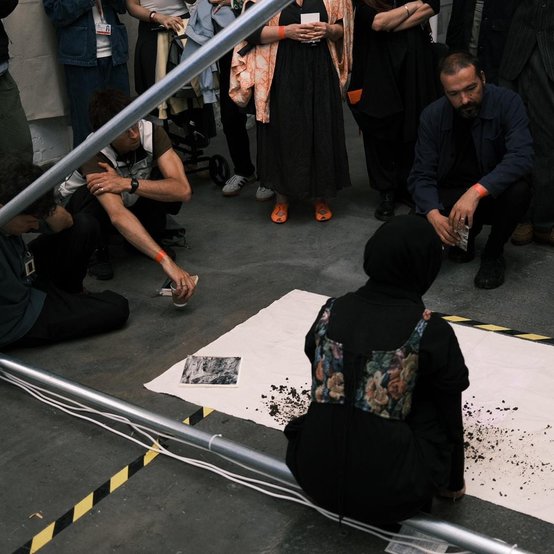
Overview
Exploring alternative forms of co-existence
Key details
- 180 credits
- 1 year / 45 week programme
- Full-time study
School or Centre
Current location
- Kensington
Next open event
Next application deadline
- Applications closed, please check back soon
Career opportunities
- Environmental Architecture graduates are expected to go on to work in a range of fields, from further academic study to roles in environmentalist NGOs, urban planning agencies and design agencies including architecture, landscape architecture and environmental design.
The future of landscapes, environments and ecosystems
- Study a pioneering programme forging a new field blending design, art and science to explore alternative environmental futures
- Work alongside communities and at sites that are uniquely placed on the front lines of environmental and climate change
- Experience studying in an art school environment and be exposed to a diversity of methods for innovation
Earth systems are changing. Intensified climate events are becoming more common. A series of metabolic rifts are arising, impacting people and the planet. Our MA Environmental Architecture creates a new field of knowledge production and practice for the design of alternative forms of co-dependence between life forms and earth systems.
Studying with us, you’ll gain insight from leading figures in Environmental Architecture as you explore histories and theories of environmental change, multispecies and more-than-human design, environmental law and climate justice.
As part of the programme, you’ll engage with live projects at sites of complex environmental change. Work with experts from other disciplines, such as filmmakers, lawyers, anthropologists or biologists. Embark on multiple-day field trips where you can meet stakeholders and local communities while testing and exploring environmental research and design methods.
A rich culture of radical ideas
Research within our community is diverse. You might explore sustainable forms of design, concepts of stewardship, or land-use and settlement patterns. But the options don’t end there – we also look at areas such as the impacts of resource extraction on ecosystems, energy transition, indigenous and decolonial struggles.
Studying at a top art institution, you’ll benefit from our rich culture of interdisciplinary work. We’ll give you opportunities to forge connections through our mentorship scheme, uniting you with local and international expertise. By the end of the programme, you’ll be able to apply your knowledge to independent research and the practice of environmental architecture and design.
Explore further
Catch the replays from our latest online Open Day.
Applications are closed for our 2025 intake and will open in autumn for September 2026 entry. Register your interest to be the first to know when applications open.
Gallery
Staff
Facilities
The School of Architecture is currently based at our historic Kensington site.
View all facilitiesOur studios are the heart of day-to-day activity for the School. Studios are purpose-designed for inspiration and interaction between students of different design disciplines. Studio workspace is provided for each student. In addition, you have access to wood, metal, plastic and resin workshop facilities, as well as contemporary digital fabrication equipment and a suite of bookable project and making spaces.
Our alumni
Our alumni form an international network of creative individuals who have shaped and continue to shape the world. Click on each name to find out more.
Where will the RCA take you?- Yussef Agbo-Ola
- Tima Rabbat
- Gabriele Grigorjeva
- Mingxin Li
- Antonio del Giudice
- Asfah Hamid
- Isabel Palacios Macedo
- Will Gibbs
- Kuan Xie
- Paul Broker
More details on what you'll study.
Find out what you'll cover in this programme.
What you'll cover
What will I learn?
The MA Environmental Architecture programme aims to expand the scope and content of design-led research in the field of architecture, environmental studies and territorial management. Possible areas of inquiry can include: sustainable forms of urbanisation; concepts of stewardship and care for nature; environmental change and its effect on migration and settlement patterns; climate justice adaptation to land use practices; impacts of resource extraction on ecosystems; environmental impacts of the energy transition; post-development and degrowth; indigenous struggles for land and environments, among many others.
Students on the MA Environmental Architecture programme will have the opportunity to pursue a degree within a leading art and design institution, and to access the rich culture of radical and experimental interdisciplinary work at the Royal College of Art. Moreover, the programme will help students to establish a network of colleagues and mentors by offering them the opportunity of connecting to leading figures in Environmental Architecture both in London and internationally through an innovative practice mentorship scheme.
Programme structure
Term 1
Research Studio I: Architectures of Extraction (15 credits)
This unit consists of an introduction to the programme’s field-focused investigation into resource extraction architectures and their role in the climate and environmental crisis. It familiarises you with particular modes of work, especially design-based research methodologies, and collaborative forms of knowledge production.
Seminar I: Metabolic Rifts (15 credits)
In Seminar I: Metabolic Rifts you are introduced to the complexity of the contemporary climatic breakdown beyond the problem of global warming, and at both global and local scales. You will master different theories of environmental change, and will be asked to critically reflect on architecture’s role for devising mitigation strategies. The unit is delivered through a mix of lectures and workshops. Core theories and debates will be introduced through lectures. These will be complemented by workshops where key environmental concepts will be explored and discussed.
The end-of-term review consists of a video dialogue on a seminar topic of choice. This will be supported by the submission of an online work blog bringing together the various seminar and reading group class exercises in an appropriate range of media. A mid-term oral presentation will assess the students' work in progress.
Media Studies I (15 credits)
Situated in the School of Architecture and welcoming a student cohort from across multiple spatial design disciplines, Media Studies provides a rigorous and granular examination of historical and contemporary methodologies of media practice and research. Our collective goal is to increase critical engagement with media. We achieve this through lectures, tutorials, and workshops in which new approaches to media are conceptualised, refined, and implemented in innovative proposals and projects.
Term 2
Research Studio II: Environmental Interventions (15 credits)
In Studio II you will develop a design intervention strategy for the site explored in term 1. Emphasis will be placed on the definition of outputs, in relation to key project aims and stakeholders.
Working in groups within your Research Studios, you will propose an intervention strategy for the case studied in term 1. The strategy should be articulated in the form of a design brief, including its aims and objectives, scales of intervention and key stakeholders. You are expected to work in relation to multiple scenarios rather than a single proposition, and to consider the project's different phases of implementation.
A core element in this unit is the understanding of potential externalities such as conflicts between stakeholders or changes in the environmental, political and economic conditions that structure the project. You will be asked to consider local populations, NGOs, advocacy groups, governmental bodies or others that might be currently operating in the context of your project. You will be asked to critically explore modes of representation and communication in relation to the different forums where the project might take place. A combination of one-to-one, small and large group tutorials will be conducted regularly between students and staff. Specialists and invited experts will also contribute depending on each unit’s research interests and sites.
Seminar II: Critical Future Scenarios (15 credits)
Seminar II: Critical Future Scenarios is delivered in a blended mode. The unit will deepen your understanding of contemporary environmental architecture, through a focus on different techniques and concepts of scenario planning. Paradigmatic cases, concepts and tools will be introduced through lectures and seminars with guests, complemented by weekly student-led roundtables. Students will engage in a series of world-building exercises, exploring the possibilities of mapping and counter-mapping as both a reflective and propositional practice. Students will be asked to collectively discuss written work on a bi-weekly basis and will present work orally in the mid-term critique. Midway through the term a writing workshop will help students to start developing their end-of-term written submission. The end-of-term submission consists of a work blog which will be accompanied by a critical reflective ‘metalogue’.
School-Wide Elective (15 credits)
You choose one elective from the options given below.
Terms 1&2
AcrossRCA 1&2 (30 credits)
Across terms 1 and 2, you will participate in AcrossRCA. This unit aims to support you to meet the challenges of a complex, uncertain and changing world by bringing you together to work collaboratively in cross-programme interdisciplinary teams. In your team you will develop a self-initiated themed project, informed by expertise within and beyond the College. These projects will challenge you to collectively use your intellect and imagination to address key cultural, social, environmental and economic challenges. In doing so, you will develop and reflect on the abilities required to translate knowledge into action, and help demonstrate the contribution that the creative arts can make to our understanding and experience of the world.
Term 3
Independent Research Project (60 credits)
The purpose of the Independent Research Project (IRP) is to enable you to apply the intellectual, technical and professional skills that you have developed throughout the programme to a challenging self-set brief. The IRP can be developed either individually or in group, and it should be based on the proposition for intervention developed in Research Studio II, Environmental Interventions. This is an opportunity for you to reflect on the theme of the studio while pursuing your own research interests.
The IRP includes a public presentation of work and exhibition, alongside peers from your programme, and following the conclusion of taught elements of the unit. This activity will help you to present the key design intentions of your work orally and visually. Focus will be given to forms of representing and communicating complex environmental issues, with a particular focus on exploring environmental aesthetics. You can make use of a variety of media including film, animation, models, drawings or other as adequate.
IRP teaching consists of studio-based tutorials and seminar sessions focusing the written components. Additionally, you will require access to technical facilities and the library. The IRP can be submitted through project or by thesis, and across a multiplicity of media and formats, from drawings, to film, animation or model making.
This MA is delivered over 45 weeks.
AcrossRCA
AcrossRCA is a compulsory 30-credit unit which is delivered as part of all MA programmes.
Situated at the core of your RCA experience, this ambitious interdisciplinary College-wide unit supports you in responding to the challenges of complex, uncertain and changing physical and digital worlds. Developed in response to student feedback, AcrossRCA creates an exciting opportunity for you to collaborate meaningfully across programmes.
Challenging you to use your imagination and intellect to respond to urgent contemporary themes, this ambitious unit will provide you with the opportunity to:
- make connections across disciplines
- think critically about your creative practice
- develop creative networks within and beyond the College
- generate innovative responses to complex problems
- reflect on how to propose ideas for positive change in local and/or global contexts
AcrossRCA launches with a series of presentations and panel discussions from acclaimed speakers who will introduce the themes and act as inspirational starting points for your collaborative team response.
Delivered online and in-person across two terms, the unit has been designed to complement your disciplinary studies and to provide you with a platform to thrive beyond graduation.
Design studio

The weekly design studio is the core of the MA programme. Work in the studio is organised individually and in small student groups (2–4 students), and teaching is conducted during weekly group tutorials and pin-up presentations.
The design studios introduce the pedagogy of the programme, provide you with design skills and research methodologies to analyse case studies, while assisting you with the formulation of research and design proposals. The teaching model combines written and design components, as both are considered essential practices in the generation of a disciplinary ecology. Currently, the programme features three design studios, each exploring architecture’s potential contribution to communities and organisations engaged in territorial disputes and resource extraction:
RS3: Alentejo Research Unit / Liquid Deserts Studio
Previous design studios:
Seminars

Environmental questions are rarely far from contemporary public debate.
Climate change, global warming, global forest fires, and extreme weather events, mass species extinction, the pollution of our air, seas, land and rivers, not to forget the pollution of our own bodies and food supplies are all daily headline news in print and televisual media.
How should we think about these questions within a school of architecture?
Seminars require constant engagement and involvement by students in course material selection and preparation, collective discussions and oral presentations.
Past guests include: Susan Schuppli, Pedro Neves Marques, Adrian Lahoud, Lindsay Bremner, Nabil Ahmed, Nikos Katsikis, Shela Sheik, RIVAL, Zannah Mae Matson, Andreas Philippopoulos-Mihalopoulos, Phineas Harper, Imani Jacqueline Brown and Professor Aran Chadwick.
Media studies
This unit enables students to explore how architects communicate ideas from both a contemporary and historical perspective. This encompasses a range of media that spans disciplines, ideologies and methods.
Students will use both analogue and digital technologies to understand better how a designer creates, interrogates and manipulates spatial environments.
This investigation will take place in a critical context, which explores how images are used to manufacture socio-political ideologies and negotiate public identities.
Practice mentors

A practice mentorship programme connects students to a network of practitioners through regular meetings taking place in Term 2 and 3, who will introduce you to different types of practice and career issues. You will have the opportunity to meet with different practices representing a variety of possible professional pathways that you might be interested in after completing your studies. In doing so we hope professional practices and organisations might have a foundational role in your development.
Recent practice mentors include:
Atmos Lab
Marc DuBois
Claudia Montero - Fundación Desierto de Atacama
Pippa Howard – Fauna & Flora International
Dr. Maria Guevara, MD – Médecins Sans Frontières
Nashin Mahtani
Future Firm
Konstantina Koulouri – Dark Matter Labs
Dane Carlson – REALMS
Events

Curation, installation, and exhibition are important methods of communication that opens new dialogues about environmental conflicts; while helping creative the threads of research and design travel and form new collaborations. Throughout the programme students have opportunities to show their work within and outside of the RCA.
Requirements
What you need to know before you apply
Candidates are selected entirely on merit and applications are welcomed from all over the world. The selection process will consider creativity, imagination and innovation as demonstrated in your portfolio, as well as your potential to benefit from the programme and to achieve high MA standards overall.
This programme accepts students from a wide range of backgrounds, including career changers. Many of those who join the programme will be students of architecture with a 3+2-year Bachelor and Master’s degree, or master-equivalent 5-year diploma preferably in Architecture, Landscape Architecture, Landscape Urbanism, Urban Design or other related design discipline looking to acquire expertise in large scale, environmental and ecological design projects.
However the programme also attracts many people from other backgrounds, such as fine arts, social sciences, geography, urban studies, planning or economics, as well as those who do not already have a Master's degree. If your prior work is of exceptional merit and you’re able to demonstrate your ability to work alongside and contribute to multidisciplinary teams, please do apply. Evidence of your intellectual and professional curiosity and a readiness to engage in a rigorous and demanding period of study is essential.
What's needed from you
Portfolio requirements
Environmental Architecture is a speculative and interdisciplinary programme aimed at exploring the contribution of architecture to our current environmental and climate crises. We welcome architects and designers from all diverse fields of expertise, career changers and people with unique experiences and backgrounds.
If you're not a designer, don’t worry – show us how you’ve addressed environmental and ecological issues in your field, communicate it visually or in writing, evidencing your unique creativity in whatever form this may take.
When uploading your portfolio, we would like you to prioritise pieces of work that showcase:
- ability and commitment in addressing environmental and climate issues
- technical design or visualisation skills (these might take the form of drawing, model making, 3D modelling, animation, film, photography, exhibition design or others)
- research skills (this could include academic papers, fieldwork and documentary practices, science-based environmental analysis or other).
Personal statement
Please provide a 300-word written personal statement that addresses the following points:
- Introduce yourself, your interests and your motivations for applying to the Royal College of Art, and to this programme in particular.
- Briefly summarise any educational background and professional experience to date that will support your application.
- Tell us what you want to do in the future.
Your journey: video requirements
While portfolios showcase important technical and design skills, there are certain aspects of an application that are better grasped by hearing you speak about your own work. As part of your application, you must submit a video of no more than two minutes as part of the application process.
Please take this opportunity to tell us a bit more about your motivations and personal interests, and how these have led you to apply to this programme.
Start by telling us what led to your interest in the Environmental Architecture MA. Could you reflect on some of the difference ways by which architecture could have a positive contribution to addressing climate change?
Finally, where do you see yourself in the future, and what you expect to gain from studying at the Royal College of Art and in the MA Environmental Architecture.
English-language requirements
If you are not a national of a majority English-speaking country you will need the equivalent of an IELTS Academic or UKVI score of 6.5 with a 6.0 in the Test of Written English (TWE) and at least 5.5 in other skills. Students achieving a grade of at least 6.0, with a grade of 5.5 in the Test of Written English, may be eligible to take the College’s English for Academic Purposes course to enable them to reach the required standard.
You are exempt from this requirement if you have received a 2.1 degree or above from a university in a majority English-speaking nation within the last five years.
If you need a Student Visa to study at the RCA, you will also need to meet the Home Office’s minimum requirements for entry clearance.
Student Visas
If you require a Student Visa (part-time route) for the MA Environmental Architecture programme, you will have work restrictions and will not be allowed to work in the UK during your studies. If you are currently employed on a Tier 2 visa you can apply for the part-time MA Environmental Architecture programme as long as you can continue to work for the same employer who is sponsoring you, otherwise you would need to switch to a Student Visa (part-time route) and would no longer be allowed to work in the UK.
For more information please see Student Visa or contact our Student support team.
Fees & funding
For this programme
Fees for new students
Fees for September 2025 entry on this programme are outlined below. From 2021 onward, EU students are classified as Overseas for tuition fee purposes.
Home (Full-time)
Overseas and EU (Full-time)
Home (Part-time)
Overseas and EU (Part-time)
Deposit
New entrants to the College will be required to pay a non-refundable deposit in order to secure their place. This will be offset against the tuition fees.
Home
Overseas and EU
Progression discount
For alumni and students who have completed an RCA Graduate Diploma and progress onto an RCA MA programme, a progression discount of £1,000 is available.
* Total cost is based on the assumption that the programme is completed in the timeframe stated in the programme details. Additional study time may incur additional charges.
Scholarships
Scholarships
The RCA scholarship programme is growing, with hundreds of financial awards planned for the 2025/6 academic year.
For more information and examples of financial awards offered in 2024/25, visit the Scholarships & awards webpage.
You must hold an offer to study on an RCA programme in order to make a scholarship application in Spring 2024. A selection of RCA merit scholarships will also be awarded with programme offers.
We strongly recommend that you apply for your programme as early as possible to stand the best chance of receiving a scholarship. You do not apply directly for individual awards; instead, you will be invited to apply once you have received an offer.
More information
Additional fees
In addition to your programme fees, please be aware that you may incur other additional costs associated with your study during your time at RCA. Additional costs can include purchases and services (without limitation): costs related to the purchase of books, paints, textiles, wood, metal, plastics and/or other materials in connection with your programme, services related to the use of printing and photocopying, lasercutting, 3D printing and CNC. Costs related to attending compulsory field trips, joining student and sport societies, and your Convocation (graduation) ceremony.
If you wish to find out more about what type of additional costs you may incur while studying on your programme, please contact the Head of your Programme to discuss or ask at an online or in person Open Day.
We provide the RCASHOP online, and at our Kensington and Battersea Campuses – this is open to students and staff of the Royal College of Art only to provide paid for materials to support your studies.
We also provide support to our students who require financial assistance whilst studying, including a dedicated Materials Fund.
External funding
There are many funding sources, with some students securing scholarships and others saving money from working. It is impossible to list all the potential funding sources; however, the following information could be useful.
Payments
Tuition fees are due on the first day of the academic year and students are sent an invoice prior to beginning their studies. Payments can be made in advance, on registration or in two instalments.
Ask a question
Get in touch if you’d like to find out more or have any questions.

